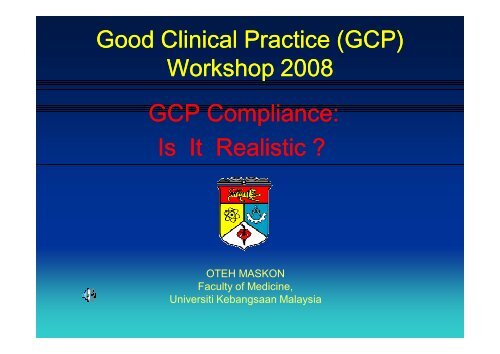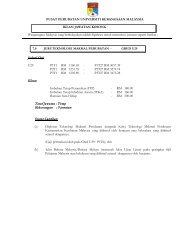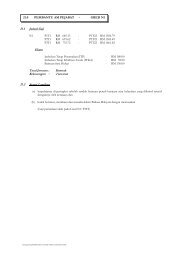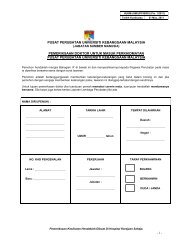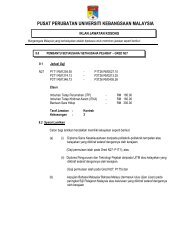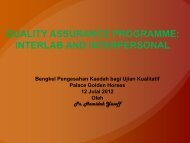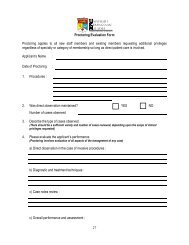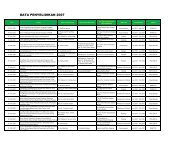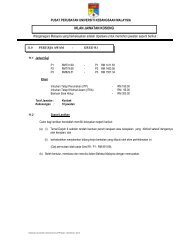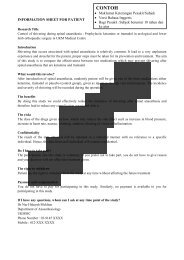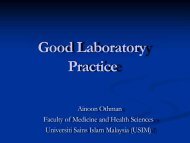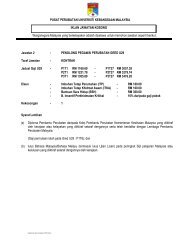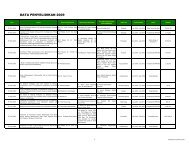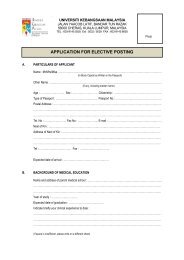GCP - UKM Medical Centre - Universiti Kebangsaan Malaysia
GCP - UKM Medical Centre - Universiti Kebangsaan Malaysia
GCP - UKM Medical Centre - Universiti Kebangsaan Malaysia
You also want an ePaper? Increase the reach of your titles
YUMPU automatically turns print PDFs into web optimized ePapers that Google loves.
Good Clinical Practice (<strong>GCP</strong>)<br />
Workshop 2008<br />
<strong>GCP</strong> Compliance:<br />
Is It Realistic <br />
OTEH MASKON<br />
Faculty of Medicine,<br />
<strong>Universiti</strong> <strong>Kebangsaan</strong> <strong>Malaysia</strong>
Disclosure of Financial Relationships<br />
with Pharmaceutical Companies<br />
Research Grants & Contracts (Principal Investigator):<br />
Advisory Board Member:<br />
Deliver Lectures For The Following:
<strong>GCP</strong> adoption in the Asia Pacific Region<br />
Original ICH <strong>GCP</strong> 1996<br />
Since then:<br />
Singapore <strong>GCP</strong> 1998<br />
<strong>Malaysia</strong>n <strong>GCP</strong> 1999<br />
Chinese <strong>GCP</strong> 1999<br />
Thailand 2000<br />
Indonesia 2001<br />
<strong>Malaysia</strong>n <strong>GCP</strong> 1999<br />
and 2 nd edition 2004
<strong>Malaysia</strong>n Good Clinical Practice<br />
(M<strong>GCP</strong> )
”Great<br />
Complicated<br />
Paperwork”
Delays in clinical trials<br />
Difficulty in recruiting patients is the<br />
most frequently cited cause for<br />
delays in clinical trials…..(Reproduced<br />
from McKinsey Quarterly “A cure for clinical trials”<br />
May 2002)<br />
Collection<br />
CRF data<br />
IRB/IEC<br />
Approval<br />
L o s t D a y s<br />
18 13<br />
19<br />
27<br />
23<br />
SDV (Source Data<br />
Verification)<br />
Difficulty in<br />
Recruiting<br />
Patients<br />
DCF(Data Clarification Form)s
Complaints about <strong>GCP</strong> Compliance 1<br />
1. Too much time spent on paperwork. Not<br />
enough time.<br />
2. Why can’t I conduct the research the way I<br />
run my clinic and ward practice <br />
3. It is a a chore, a hassle, a burden.<br />
You feel you have to change.<br />
Put on a different mask<br />
5. Why am I the only one trying to adhere to<br />
<strong>GCP</strong> Others are indifferent and got away<br />
with it.
Complaints about <strong>GCP</strong> Compliance 2<br />
6. You have to do things differently<br />
7. You have to relearn new ways of doing things<br />
How you write in the notes, lab results are to be acknowledged (signed), use<br />
of acronyms etc etc.<br />
8. The anxiety about being audited<br />
Internally or externally<br />
The audit process<br />
9. Someone is looking over you.<br />
The monitor or CRA, usually your junior and non-medical (“may behaves as<br />
though she is the expert in <strong>GCP</strong>” pardon the expression) is looking at your<br />
writing and your work. Most of the time he or she tells you or points out to<br />
you what ‘s wrong with your work.<br />
10. Support from pharma or sponsors i.e. approach<br />
taken the CRA, CRM<br />
“No touch technique”, “Behave as though they are performing an audit”
Factors that hinder the proper<br />
implementation of <strong>GCP</strong> 1<br />
1. Lack of understanding (before attending a <strong>GCP</strong> course) or<br />
appreciation of the importance (after attending a <strong>GCP</strong><br />
course)<br />
Quality of the research<br />
Protection of your patients<br />
2. Time<br />
Documentation<br />
Details<br />
3. Experience & second nature<br />
Takes time to develop<br />
4. Dual environment<br />
Normal clinical practice vs research
Factors that hinder the proper<br />
5. Research Team<br />
implementation of <strong>GCP</strong> 2<br />
Commitment & dedication<br />
6. Institution, Operating Procedures<br />
Bureaucracy<br />
7. Funding Organisation/ Pharma/ Third Party<br />
Replacement of sites, Protocols, Different standards<br />
European MDEA vs. US FDA<br />
Issue of third party ‘middle man’ conducting research<br />
(see NEJM Oct 2007)<br />
8. Incentives / Bonuses<br />
Competing studies<br />
Coercion
<strong>GCP</strong> : Practical Issues 1<br />
1. Delay in obtaining EC/IRB approval<br />
2. Implementation of the Study Protocol<br />
Practicality<br />
Scientific merit or post-marketing exercise or commercial drive<br />
3. Informed Consent Forms<br />
Most Important Document<br />
4. Recruitment of Subjects<br />
Issue of pre-screening<br />
Inducement or enticement vs <strong>GCP</strong> violation<br />
What is the drive <br />
5.Investigators & Study Nurses or Coordinators<br />
Degree of obsession<br />
Cooperation
<strong>GCP</strong> : Practical Issues 2<br />
6. Non-investigator health care provider<br />
Change therapy<br />
Communication & Understanding<br />
Role of the subjects, Identification Card<br />
7. Reporting of AE/SAE/Protocol Violation & Deviation<br />
Time frame, Sponsor & IRB<br />
8. Data Queries (DNF)<br />
Too many queries generated<br />
Participation of Sponsor’s CRA<br />
9. Sponsor & Regulatory Body Audits<br />
10.Intellectual Property & Publication Agreement<br />
11.Too Many Clinical Drug Trials<br />
Competing Studies
During the 1990’s, the deaths of two healthy volunteers<br />
in the US made their way to the highest political levels<br />
and forced a review of human subjects protections<br />
Jesse Gelsinger<br />
18 year old<br />
Healthy Volunteer<br />
Genetic Study<br />
Ellen Roche<br />
24 year old<br />
Healthy Volunteer<br />
Asthma study
The Death of a 4 year in old 2002:<br />
An Unfortunate Mistake<br />
A four-year-old child died at the Children's<br />
Hospital of Eastern Ontario after he was<br />
mistakenly given a "significant overdose"<br />
of an experimental drug (19x Interleukin<br />
II): honest medical error<br />
The trial was not submitted nor approved<br />
by Canadian regulatory authorities and<br />
some information channels were therefore<br />
not open.<br />
The trial and REB were inspected by FDA,<br />
a warning letter was issued. No measure<br />
taken from the Canadian side.<br />
This case alone has raised lots of<br />
suspicion in the US about the human<br />
subject protection regime in Canada<br />
Ryan Lucio died<br />
at the age of 4 in<br />
September 2002.
Issues in <strong>GCP</strong> Implementation<br />
Understand;<br />
1. It is a law, it is an act of parliament<br />
Before you are allowed to practice medicine you have to<br />
abide by a code of conduct & ethics.<br />
Among other things you are sworn to the care of the<br />
patient, have their safety as a paramount concern,<br />
maintain confidentiality etc etc.<br />
Similarly…
<strong>Malaysia</strong>n <strong>GCP</strong> Guideline 2004<br />
IRB / IEC<br />
3.2.7. An institution without IRB/IEC<br />
may request IRB/IEC of Ministry of<br />
Health <strong>Malaysia</strong> or the <strong>Universiti</strong>es to<br />
make decisions on behalf of the said<br />
institution.
<strong>Malaysia</strong>n <strong>GCP</strong> Guideline 2004<br />
5.20.3<br />
The DCA will enforce the rules and punitive<br />
action will be decided by the DCA
<strong>GCP</strong><br />
“Regulations tell you what you<br />
are required to do by law.<br />
Guidelines tell you the best<br />
way to do it”
Mitchell Creinin from Pittsburgh:<br />
Trial on a medical device<br />
Inform Subject<br />
“…informed consent document…does not identify<br />
foreseeable risks…”<br />
Notify IRB<br />
“…failed to submit the sponsor’s model consent form … to<br />
the Magee-Womens Hospital IRB…”<br />
Adhere to Protocol<br />
“…log forms were not completed…in specific dates.”<br />
Report Adverse Events<br />
“irritation or discomfort…was not recorded on …case report<br />
forms.”<br />
Maintain Records<br />
“You did not maintain complete records related to<br />
each…case history.”
Michael Gruber from NYU:<br />
Trial using biologics<br />
Maintain Records<br />
“…failed to prepare and maintain…accurate case<br />
histories…” AND “…lack of source data…”<br />
Retain Records<br />
“…failed to retain investigational records.”<br />
Adhere to Protocol<br />
“…there were many deviations from the protocol<br />
requirements…”<br />
Supervise<br />
“…nurse practitioner was not listed on the Form FDA-<br />
1572 as subinvestigator,…”
Alkis Togias of John Hopkins: Clinical drug trial<br />
Learn Investigator’s Brochure<br />
“…you also failed to submit supporting data…”<br />
Notify IRB<br />
“You failed to notify and obtain IRB approval…”<br />
Report Adverse Events<br />
“…you failed to promptly report…unanticipated problems…”<br />
Adhere to Protocol<br />
“You changed the dosing conditions set forth in the<br />
protocol…”<br />
Inform Subjects<br />
“…the following essential elements…were not included…”<br />
Maintain AND Retain Records<br />
“You failed to systematically record..” “No records were<br />
available…”
Recent FDA Enforcement Letters<br />
To Clinical Investigators<br />
Most common findings<br />
Failure to follow the protocol<br />
Failure to personally conduct or supervise the<br />
study<br />
Failure to prepare and maintain adequate<br />
and accurate case histories<br />
Failure to maintain drug accountability records<br />
Failure to obtain valid informed consent
What the FDA Typically Finds<br />
100<br />
90<br />
85<br />
82<br />
80<br />
74<br />
70<br />
67<br />
% Identified Findings<br />
60<br />
50<br />
40<br />
30<br />
44<br />
20<br />
10<br />
0<br />
Documentation Protocol Violations Reporting<br />
Violations<br />
Human Subject<br />
Safety<br />
Device/Drug<br />
Control
What Are They Complaining About<br />
Informed Consent Issues<br />
Falsification<br />
Failure to report adverse<br />
events<br />
Failure to follow the<br />
protocol<br />
Inadequate Records<br />
Qualifications of persons<br />
performing physicals<br />
Failure to get IRB<br />
approval, report changes<br />
in research<br />
Failure to follow FDA<br />
regulations<br />
Drug accountability<br />
Recruitment Practices<br />
Poor Supervision<br />
No active IND<br />
Violations of GLP regs<br />
Monitoring practices<br />
Blinding<br />
Charging for the test<br />
article<br />
Misleading advertisements
Clinical Investigator<br />
Deficiency Categories*<br />
35% 35%<br />
35%<br />
30%<br />
25%<br />
20%<br />
15%<br />
10%<br />
5%<br />
0%<br />
19%<br />
11% 10%<br />
n=285<br />
*Foreign & Domestic CDER Inspections - FY 01<br />
12/4/01
Inspections of Ethics Committee -<br />
Deficiencies<br />
50%<br />
45%<br />
40%<br />
35%<br />
30%<br />
25%<br />
20%<br />
15%<br />
10%<br />
5%<br />
0%<br />
49%<br />
43%<br />
21%<br />
19% 18% 18%<br />
(FY’01: CDER assigned)<br />
N= 129
Sponsor/Monitor/CRO Inspections<br />
Common Deficiencies 1998-2000<br />
n= 39<br />
25%<br />
20%<br />
23%<br />
21%<br />
18%<br />
Failure to adequately<br />
monitor study<br />
Failure to document<br />
monitoring visits<br />
15%<br />
15%<br />
13%<br />
Failure to have or<br />
follow SOPs<br />
10%<br />
10%<br />
Failure to maintain<br />
drug acct. records<br />
5%<br />
Failure to select<br />
qualified monitors<br />
0%<br />
Failure to assure IRB<br />
approval of study
Other Issues 1<br />
1. EC / IRB Approval<br />
2. Signatures<br />
3. Submitted Documents<br />
4. Informed Consent<br />
5. Delegation, Responsibilities & Supervision<br />
6. Documentation<br />
7. Review of Results<br />
8. SAE/AE Reporting<br />
9. Drug Accountability
Other Issues 2<br />
EC Approval<br />
Signatures<br />
Number of Corum<br />
Delegation Document<br />
Source Data<br />
Missing Investigations<br />
Review & verifying results<br />
Electronic CRF<br />
SAE & AE Reporting<br />
Missing Drugs
Issues in <strong>GCP</strong> Implementation<br />
Understand;<br />
1. It is a law<br />
2. It is introduced for a purpose<br />
3. The purpose is two-fold<br />
Let’s look at the definition of <strong>GCP</strong> to<br />
understand the purpose
Good Clinical Practice (<strong>GCP</strong>)<br />
A standard for the design, conduct, performance,<br />
monitoring, auditing, recording, analyses, and<br />
reporting of clinical trials that provides<br />
assurance that<br />
the Data and Reported Results are Credible, and<br />
Accurate, = Quality Data<br />
and that<br />
the Rights, Integrity, and Confidentiality of Trial<br />
Subjects are Protected. = Ethics<br />
Quality Data + Ethics = <strong>GCP</strong>
Investigator Obligations<br />
Authorisations (Trial/Manufacturing) from CA<br />
Approvals from Ethics Committee<br />
<strong>GCP</strong> compliance<br />
Patient consents<br />
AE \ SAE reporting to Sponsor
If you want to be an investigator……<br />
You must make time to do the study<br />
You must be interested in the scientific aspects<br />
of the trial and not the financial rewards only<br />
You must be sure that you can meet the<br />
recruitment targets<br />
You should not have competing trials<br />
You must be aware of and adhere strictly to the<br />
investigator’s <strong>GCP</strong> responsibilities
Commitments<br />
S _______<br />
M ______ ______<br />
A _____ to _______<br />
L ____ __________ ________<br />
L et FDA Inspect<br />
__P__ _______ _______<br />
R etain Records<br />
I _____ _______<br />
N ____ _ _ _<br />
T ____ ______
Commitments<br />
S _______ upervise<br />
M ______ aintain ______ Records<br />
A _____ dhere to _______ Protocol<br />
L ____ earn __________ Investigator’s ________<br />
Brochure<br />
L et FDA Inspect<br />
Re ort Adverse Events<br />
__P__ _______ _______<br />
R etain Records<br />
I nform _____ Subjects _______<br />
N otify ____ _ EC_ _<br />
T ____ rain ______ Staff
Commitments<br />
P<br />
e<br />
o<br />
p<br />
l<br />
e<br />
N<br />
e<br />
e<br />
d<br />
s<br />
S upervise _______<br />
M ______ aintain Records ______<br />
A _____ dhere to _______ Protocol<br />
L ____ earn __________ Investigator’s Brochure ________<br />
L et FDA Inspect<br />
__P__ Re ort _______ Adverse _______ Events<br />
R etain Records<br />
I _____ nform Subjects _______<br />
N otify ____ _ I _ R B _<br />
T ____ ______<br />
rain Staff<br />
Data Quality<br />
Ethics
Patients vs Subjects<br />
When a person volunteers to<br />
participate in a research trial, he/she<br />
has become a “subject”.<br />
Subjects may not be receiving<br />
“standard of care” as a “patient”.<br />
The risks may be higher<br />
Documentation for subjects is MORE<br />
EXTENSIVE than regular patient<br />
documentation
If it was not documented, it<br />
was not done
Can’t my Study Coordinator handle<br />
this documentation stuff <br />
The regulations hold the Investigator<br />
responsible for assuring that the<br />
data is correct, reliable, valid and<br />
organised<br />
The research documentation must<br />
clearly show that the investigator<br />
was involved in study evaluations<br />
and decisions
Investigator Responsibility for Data<br />
While a good coordinator is essential<br />
to a well conducted trial, the<br />
investigator should be careful to:<br />
1. Refrain from over-delegating<br />
2. Document his/her involvement in<br />
activities such as eligibility<br />
determination, adverse events, follow<br />
up visits, outcomes, informed consent<br />
3. Write orders for study treatments and<br />
drugs<br />
4. Regularly review the coordinator’s work<br />
5. Not rely on the sponsor’s monitor to<br />
check the coordinator’s work<br />
6. Allow only the study team members to
Making Corrections on study records<br />
Do:<br />
Make one line through the entry<br />
Write the corrected entry beside it<br />
Initial, date and time the correction<br />
Be able to see the incorrect entry.
Don’t<br />
Making Corrections on study<br />
records<br />
Use White out (Blank-out)<br />
Scratch through an entry<br />
Use different colored inks<br />
Let the monitor write on the CRF<br />
Sign the investigator’s name
Who can obtain informed consent<br />
Informed Consent<br />
'Thanks for telling me your entire<br />
medical history but I'm the hospital<br />
barber.'
For Consent Form<br />
Process of communication<br />
Provide correct and understandable info.<br />
Protect the subject<br />
Must be approved by EC<br />
Consent must be freely given<br />
Must be properly documented<br />
Informed Consent
1. Informed Consent<br />
During an audit by a European Commission<br />
Team, they stumbled upon a CRF without a<br />
consent form.<br />
a. What do you do<br />
b. What precautionary measures do you take to<br />
prevent this from ever happening again
2. Informed Consent<br />
During an audit, the team stumbled upon a<br />
consent form. Subject does not speak English but<br />
the consent form was in English.<br />
a. What do you do<br />
b. What precautionary measures do you take to<br />
prevent this from ever happening again
3. Informed Consent<br />
During an audit, they stumbled upon two copies<br />
of consent forms.<br />
a. What is the problem <br />
b. What do you do<br />
c. What precautionary measures do you take to<br />
prevent this from ever happening again
“Read the SMALL PRINT of the<br />
1572” [Investigator Commitments: Box 9]<br />
I agree…to make those records available for inspection
How to conduct clinical trials in<br />
MOH <strong>Malaysia</strong><br />
• Application to MREC<br />
• Application to NPCB<br />
– Clinical trial import license<br />
– Relevant permits for drug under study<br />
• Parallel submission to DCA and EC<br />
allowed
Research Management in<br />
MOH<br />
Standing Committee For <strong>Medical</strong> Research<br />
NIH<br />
Directorate<br />
National<br />
Committee For Clinical<br />
Research<br />
NIH<br />
MOH departments<br />
MREC<br />
Animal Care &<br />
Use Committee<br />
DCA
Application submission<br />
5 copies<br />
Secretary,Standing Committee for <strong>Medical</strong> Research (SSCMR) - 1 copy<br />
Open file;assign project code<br />
MREC decision<br />
Secretary, MREC (4 copies)<br />
incomplete<br />
Return to applicant<br />
inform<br />
SSCMR<br />
complete<br />
Open file Approval<br />
Appeal<br />
SSCMR<br />
Director General<br />
MREC<br />
Close file<br />
Final decision
Review process (MREC)<br />
Preliminary assessment<br />
Involve human subjects<br />
YES<br />
NO<br />
Scientific Review<br />
Ethical Review<br />
Approval
<strong>GCP</strong> is not a wallpaper you paste<br />
over your Clinical Development;<br />
it is to be built into the Structure.
We need sound science, ethics and safety<br />
in clinical trials to sustain the trust of<br />
sponsors, governments, public and<br />
especially research subjects & patients:<br />
sustained trust is a condition to allow<br />
research for the advancement of medicine.<br />
Trusts at the institution,<br />
department,<br />
team and<br />
individual level.<br />
Trust
Do not differentiate your everyday clinical<br />
practice from your research activities<br />
Whatever you do for in your research clinic or<br />
ward should also be practiced in your normal<br />
clinic and ward.
Closing Remark<br />
Look after your data !<br />
Look after your subjects !


